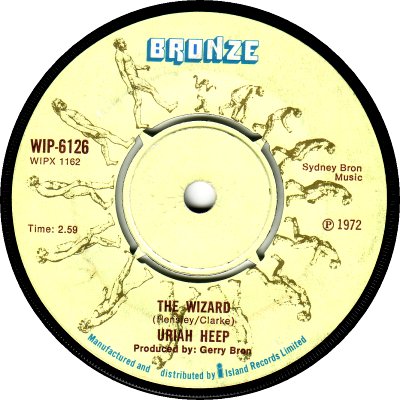
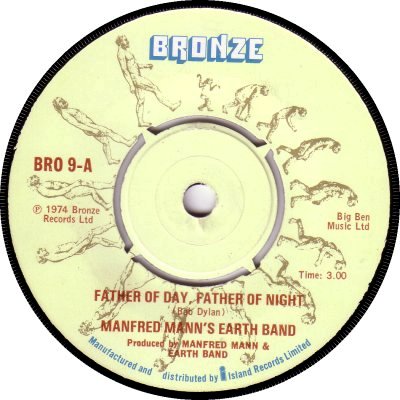
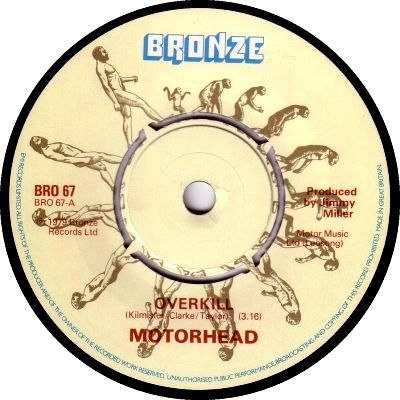
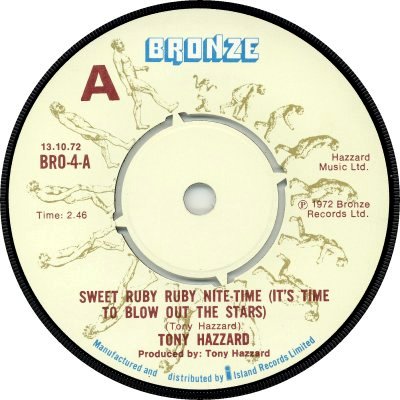
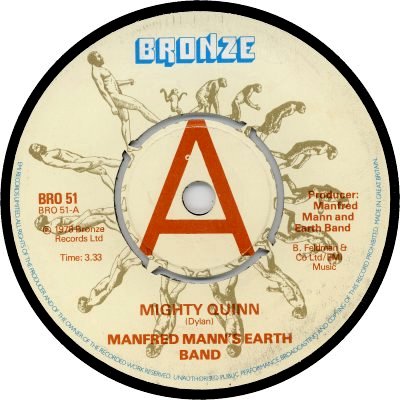
Bronze was founded in the spring of 1971 by management / production magnates Gerry and Lilian Bron as an outlet for product from their Hit Records production company. Its first mention in 'Record Retailer' came in the issue of the 27th of February, which stated that the new label might possibly be launched at the end of the following month. The article added that although Hit Records had a licensing deal with Philips it wasn't known whether the Brons would place their new label with that company or not. In the event 'RR' of the 20th of March reported that the Brons and Hit had split with Philips, taking with them artists such as Colosseum, Uriah Heep, Juicy Lucy and Richard Barnes. A week later 'RR' of the 27th of March broke the news that Bronze had signed to Island (q.v.) in a three-year licensing deal. It added that Bronze was the first 'outside' label to be sold / marketed by Island. During the build-up to the launch the 'Gossip' column of 'RR' of the 24th of April claimed that the name 'Bronze' had been suggested, or chosen, by Iain Clark, the drummer with Uriah Heep. Finally 'RR' of the 1st of May reported that Bronze's first releases, an album and a single, were due out the following week.
Bronze's three years with Island seem to have been mutually agreeable, as 'Music Week' of 2nd of March 1974 revealed that the deal had been extended for a further three years, with Bronze taking on the main responsibility for the co-ordination of marketing and promotion. It appears that the Brons had plans for a 'pop' label: 'MW' of the 27th of April said that because of a variety of factors those plans had been shelved, and the new label was unlikely to appear for at least a year to eighteen months. Records by Sparrow and Gene Pitney had been intended to be issued on the new marque, but they would be coming out on Bronze instead. Sadly the plans were never un-shelved and the 'pop' label never materialized. Bronze's next mention in 'MW' came in the issue of the 12th of June 1975, which said that Lilian Bron had made history by being appointed managing director of the company - according to the article she was the first woman MD of a UK record company.
1977 saw Bronze parting company with Island: 'MW' of the 26th of February reported that the company had signed a licensing deal with EMI, which would be effective from April 1st. Later that year David Betteridge ended his fifteen-year spell with Island and came to Bronze, replacing Lilian Bron as MD ('MW', 19th November 1977). In the summer of 1978 a licensing deal was made with the American label Red Star (q.v.), which led to a small number of records appearing on that label with Bronze catalogue numbers. Bronze remained with EMI until 1980, when the closure of EMI's Licensed Repertoire Division led to chaos among the licensed labels, of which Bronze was one. Responsibility for several of them, including Bronze, was transferred to Liberty-United Artists ('MW', 26th January 1980). It may be that the associated difficulties were at least partly responsible for Bronze leaving EMI and moving to Polygram, which it did in November.
Bronze seems to have had a reputation for pursuing a policy of making long-term signings of artists who were good at what they did. An impressive proportion of its records sold in large quantities worldwide; they didn't do badly at home either, with 38 out of 90 albums reaching the British charts. The company's most prominent artists were Uriah Heep, Colosseum, Manfred Mann's Earth Band and Motorhead; the latter two managed to register in the Singles Chart regularly, as well as in the Album Chart. Other hit singles were provided by the likes of Gene Pitney, Sally Oldfield and Afro-Rock band Osibisa. In 1986, however, artistic upheavals and increasing costs led to Gerry Bron selling the label and its back catalogue to Castle Music.
Initially Bronze's singles shared Island's WIP-6000 numbering series (1), but in August 1972 they were given a series of their own, BRO-0. The label design remained basically the same throughout the '70s, the only change of any great note coming when Bronze parted company with Island, in the Spring of 1977: at that point a reference to Island at the bottom of the labels disappeared (3). The changeover also saw a change in the layout of demo labels: Island-era ones had had a small brown 'A' on them, either at 10 o'clock or 2 o'clock, which was initially accompanied by a release date (4), while after the switch to EMI the 'A' grew in size and moved to the centre (5). BRO-36 was the first single to have the new labels. After the moved to Polygram, less decorative green injection moulded labels replaced the distinctive paper ones.
Manufacture of Bronze's singles appears to have been by EMI throughout the 1970s. During the Island years the script at the bottom of the labels said 'Manufactured and distributed by Island Records Limited' (2), but while Island did have its own manufacturing plant the style of the matrix numbers in the run-offs and the narrowness of the dinking perforations suggests that of most of its 7" records at this time were EMI pressings. 'MW' of the 21st of June 1975 noted that Island's plant would 'probably extend to singles next year', which lends weight to that theory. Distribution was handled by a combination of Island and EMI for most of the Island era: EMI distributed Island product to a proportion of shops - Billboard (2nd October 1976) put the figure at 45% of Island's customers. On the 1st of October 1976 Island closed its distribution arm; EMI took over the distribution of Island's own and licensed labels completely from that point ('MW', 25th September). When Bronze signed its licensing deal with EMI, in 1977, EMI naturally continued to handle both the distribution and manufacture of its records. The discography below only covers the 1970s.



Copyright 2006 Robert Lyons.

